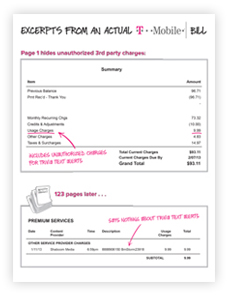Could your mobile carrier be hiding third-party charges on your phone bill that you never authorized? The FTC has alleged that T-Mobile has done just that.
The agency says that T-Mobile charged consumers not only for regular phone services, but also for third party content – including monthly subscriptions for ringtones, wallpaper, horoscope texts, flirting tips, and celebrity gossip – that consumers neither knew about nor agreed to.
According to the FTC, here’s how it happened: On the first page of the bill, T-Mobile deceptively lumped third-party charges under a general line item that also included charges for their services like texting. The obscure breakouts of each charge were on the pages toward the end of the bill. 
More surprising? The company continued to charge consumers, pocketing up to 40 percent of those third-party charges, even after some consumers caught on, complaints piled up, and industry auditors put T-Mobile on notice that the charges were unauthorized.
Here’s how to reduce the chances of paying charges crammed onto your bill without your knowledge or permission:
- Read your mobile phone bill each month – line by line, and page by page. Don’t ignore the billing statement you get in the mail or through an automated online payment system. You should know your baseline monthly bill. Taking time to read every page of your statements can help you detect potentially fraudulent charges, keep surprise charges to a minimum, and save you money.
- Consider a block on third-party charges. Many phone carriers already offer third-party blocking service for free. You just have to ask.
- Ask your mobile phone carrier for its policy on refunds for fraudulent charges. Some carriers have a 60-day period for refund requests, and many have a policy of partial refunds for fraudulent charges you detect – no matter how long the cramming charges have occurred.
- If you have a prepaid phone plan, check that you’re not losing pre-paid minutes to pay for unauthorized third-party charges. Stay on top of how many calling minutes you have, and make sure that minutes don’t go missing due to deductions unrelated to your regular phone calls. Check your accounts online or call the number your carrier gives you for account access.
If you suspect you’ve been a victim of cramming, contact your phone carrier first about the charges, then file a complaint with the FTC.



